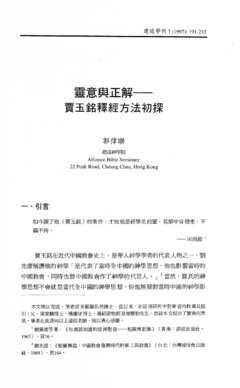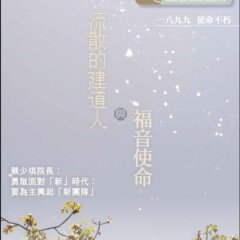靈意與正解──賈玉銘釋經方法初探 / 郭偉聯
撮要
賈玉銘是近代華人保守教會的重要聖經學者之一。本文旨在指出賈氏釋經的主要方法雖為靈意解經,卻並非一種「任意」釋經,以回應不少華人聖經學者基於歷史文法釋經觀點而對靈意釋經的批評。
本文首先簡介賈氏釋經所運用的方法:如以經解經、主題釋經及以應用為最主要目的之釋經等,都可被劃為靈意解經。筆者在分析賈氏靈意解經的運作方法後指出,歷史文法釋經是以歷史資料來保證能夠做到正確及客觀,靈意釋經則以聖靈作為保證。隨後筆者論證,賈氏的釋經是受其神學觀點規範著,而非任意而為的。筆者檢視歷史文法釋經所選取的資料,亦展示此方法並非如華人福音派學者想像般「客觀」。最後筆者以文本互涉理論說明,所有的詮釋活動,無論歷史文法釋經或靈意釋經,都是讀者主觀建構的結果,在本質上並無分別。
ABSTRACT
M. Chia has been an important biblical scholar within the Chinese conservative Christian circle since the early 20th Century. Contrary to recent Chinese evangelical scholars’ view point, the article claims that though spiritualization is the main feature for Chia’s hermeneutics, spiritualization does not mean a “free-play,” or is an inferior interpretation approach than historical-grammatical method. The article begins with a general survey on Chia’s hermeneutical methods, including scriptura ipsius interpres, thematic interpretation, and his emphasizing on spirituality cultivation as ultimate goal for biblical interpretation. The writer points out that these features reveal spiritualization is the focal point for Chia’s hermeneutics, and tries to sketch how the method of spiritualization works in his biblical interpretation. In response to critics that believing historical-grammatical method as objective and systematic, and prevails over “subjective” spiritualization “free-play,” the article offers following analysis: (1) Both historical-grammatical method and spiritualization seek to recover the authorial meaning. While historical-grammatical critic sees the hermeneutical gap between text and interpreter should be filled by historic or grammatical data, the method of spiritualization seeks the correct interpretation from Holy Spirit. (2) Chia’s spiritualization is not a “free-play,” for the interpretation is confined by his theological stance. (3) The recent biblical scholarship points out that the historical-grammatical method is not so “objective” as the Chinese evangelical scholars think. (4) The Theory of Intertextuality shows neither historical-grammatical method nor spiritualization can avoid subjective elements.
原載於《建道學刊》7期(1997年1月),頁191-233。







